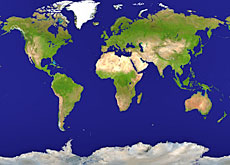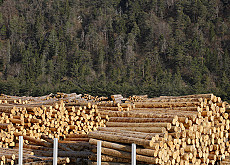UN issues dire report on climate

The United Nations Secretary-General, Ban Ki-moon, has called for "urgent, global action" to meet the challenge of climate change.
His statement followed the publication on Saturday of the fourth and final report this year of the UN scientific panel which declared that climate systems have already begun to change.
The Intergovernmental Panel on Climate Change said in the summary that the evidence was in the measured warming of air and ocean temperatures, widespread melting snow and ice, and rising sea levels.
Speaking in Madrid where the IPCC weeklong meeting concluded, Ban said the potential impact of global warming is “so severe and so sweeping that only urgent, global action will do”.
The report by the IPCC – co-winner of this year’s Nobel Peace Prize along with United States politician and climate crusader, Al Gore – is expected to guide governments meeting next month in Bali, Indonesia to discuss an agreement to succeed the Kyoto Protocol.
The existing protocol requires 36 industrial countries to reduce carbon emissions by an average five per cent from 1990 levels by 2012.
The final IPCC report lays out various scenarios of future impacts, depending on how quickly and decisively action is taken to reduce greenhouse gas emissions.
UN experts say a new global plan must be in place by 2009 to ensure a smooth transition when the Kyoto terms expire.
Adopt clean energy
Ban said there were “real and affordable ways to deal with climate change” and that the Bali talks should set the agenda and a timetable for a post-2012 plan. He said this should include funding to help poor countries adopt clean energy and to adapt to changing climates.
The IPCC says recent research has heightened concern that the poor and the elderly will suffer most from climate change since hunger and disease will be more common and droughts, floods and heat waves will afflict the world’s poorest regions threatening not only people but animal and plant species.
The report, approved by participating governments, said if the world did not act, inactivity could lead to “abrupt and irreversible changes” that would make the planet unrecognisable.
Western Europe will not be among the hardest hit regions, but countries like Switzerland will also feel the impact of global warming.
Switzerland in 2050
In its own report issued earlier this year, the Swiss government-appointed Advisory Body on Climate Change (OcCC) warned that the Swiss would have to make adaptations.
The findings and recommendations in the work titled, “Switzerland in 2050”, were based on an expected temperature rise of two degrees Celsius in autumn, winter and spring, and three degrees in summer, compared with 1990.
The report says Switzerland can expect more frequent extreme weather patterns, resulting in floods and mudslides in winter and spring, and summer heatwaves.
It predicted that output of mountain hydroelectricity plants (60 per cent of total domestic power generation) could decrease by around seven per cent, since they will have to rely more on rainwater and less on melted snow.
However, available water resources will dwindle affecting nuclear power plants (38 per cent of total domestic power generation), which rely on river water to cool the reactors.
Heatwaves and higher ozone concentrations will take a toll on people’s health, with more heat-related illnesses and deaths, and the spread of tropical diseases.
And Swiss farmers will have to deal with the spread of weeds, pests and extreme weather conditions.
swissinfo with agencies
The reports do not commit participating governments to any course of action.
But the IPCC findings are important because they are adopted by consensus, meaning those countries accept the underlying science and cannot disavow its conclusions.
The conclusions of the reports provide a common scientific baseline for political debate.
But differences remain stark on how to control carbon emissions.
While the European Union has taken the lead in enforcing the carbon emission targets outlined in Kyoto, the United States opted out of the 1997 accord.
Carbon dioxide (CO2) is one of the major gases responsible for greenhouse effect and global warming. In Switzerland it represents around 80% of harmful emissions.
The other gases include methane, nitrous oxide and hydrocarbons.
Despite ambitious emission targets, greenhouse gas emissions have actually risen by 0.4% in Switzerland since 1990.

In compliance with the JTI standards
More: SWI swissinfo.ch certified by the Journalism Trust Initiative



You can find an overview of ongoing debates with our journalists here. Please join us!
If you want to start a conversation about a topic raised in this article or want to report factual errors, email us at english@swissinfo.ch.